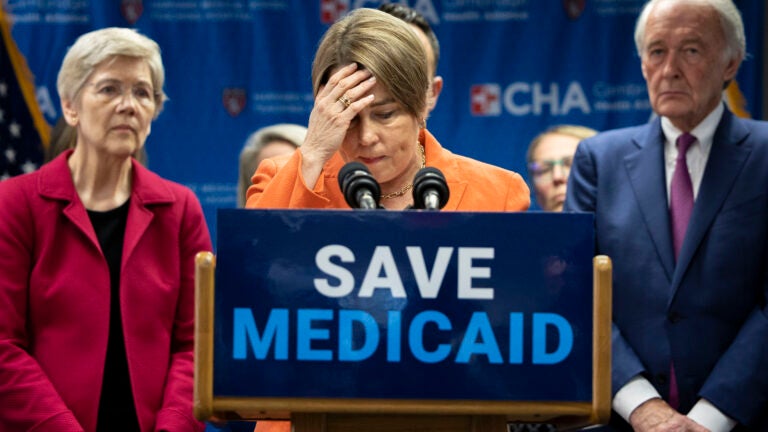Sign up for the Today newsletter
Get everything you need to know to start your day, delivered right to your inbox every morning.

The lower revenue numbers have opened up a potential $177 million budget gap. The Healey administration said the state currently is short about $39 million, but that number could grow once officials determine exactly how much it raised from the so-called millionaires tax, which won’t be clear until this fall.
Healey’s budget office estimates that the state pulled in about $240 million from the new surtax on annual income over $1 million, which voters passed last November. Roughly $103 million of that came from capital gains, which doesn’t affect the budget bottom line, but the remainder — an estimated $138 million — is currently in the general fund.
That falls in line with previous estimates from state officials, who said in January they expected the surtax to raise as much as $265 million in the final six months of the fiscal year. They said it could then be as high as $1.77 billion in the full fiscal year that started in July.
Constitutionally, any money raised from the new surtax is mandated to go to education and transportation, not to simply balance the budget. Should the Legislature vote to move that money into a new account created in the current budget to house the surtax revenue, it would then widen the budget gap.
Still, at $177 million, the gap represents a fraction of a percent of the state’s overall $56 billion budget.
Matthew J. Gorzkowicz, budget secretary for Governor Maura Healey, said in a statement that state officials are on track to avoid tapping savings to balance the budget. State budget officials also indicated they don’t believe any major cuts will be necessary.
It’s possible the state could turn to an estimated $1.2 billion escrow account, which includes money from last year’s record-breaking multibillion-dollar surplus, or other avenues.
The Healey administration is expected to file a supplemental spending bill later this summer to close the books on the fiscal year.
While the collections are a reversal from past years, state officials have for months prepared to fall short of their end-year revenue expectations after tax collections cratered in April, typically the strongest month for tax receipts. But revenue rebounded and beat expectations in both May and June. That, Gorzkowicz said in a statement, “helped to shrink the gap.”
Questions of where the state coffers stood at the end of the last fiscal year have hung over Beacon Hill for weeks. Healey on Wednesday signed a $56 billion annual state budget that hikes spending from last year by 7 percent. A week earlier, the Department of Revenue released tax collections for July — the first month of the new fiscal year — but not those for June, the closing month for the 2023 fiscal year.
Healey vetoed little from the annual budget the Legislature passed, but she did slash more than $200 million in spending, as well as language that would have allowed the state to pull the same amount from the escrow account, which includes past surplus money and is a flexible pot of cash officials can spend in a variety of ways. Healey said she instead wanted to use those one-time funds for “transformational investments.”
Doug Howgate, president of the business-backed Massachusetts Taxpayers Foundation, said overall the state is facing a “brighter picture than we were looking at in April,” but the numbers are a reminder that the heady fiscal times of the past two years are over.
“We’re not in this world of 10 percent revenue growth, or 11 percent revenue growth,” he said. “We can’t be making budgets thinking we’re in that ‘22 world.”
Other states ended the fiscal year in better positions than Massachusetts, according to the National Association of State Budget Officers. Most that have reported their year-end revenue figures beat their original forecasts, the nonpartisan nonprofit found, with some enjoying hefty surpluses.
Georgia, for example, finished the year with a roughly $4.8 billion surplus, while Virginia’s governor said it ended the year with $5.1 billion in excess resources. Kentucky beat its estimates by $1.4 billion, Pennsylvania by $1.3 billion, and Connecticut had hundreds of millions of dollars in surplus dollars even after previously passing the largest tax cut in its history, according to NASBO.
Others have far smaller surpluses, which officials have weighed using to help pay down unfunded pension liabilities or debt, or investing in other things, like education, according to NASBO.
It’s a position Massachusetts, too, enjoyed in recent years. Last year’s $5 billion surplus helped cover a $3 billion refund that flowed back to taxpayers after a windfall of tax collections triggered a 1986 tax-cap law for just the second time in nearly four decades. A year earlier, the state had $1.5 billion more than it expected to collect.
The state’s sudden drop in revenue in April appeared to be driven by two main factors, budget officials said at the time. The state collected less in capital gains revenue than projected, and more members of pass-through entities collected their share of $1.4 billion in available credits than anticipated.
The state in 2021 adopted a change in law enabling the pass-through entities — such as partnerships or certain limited liability companies — to avoid the federal cap on state and local deductions by allowing them to pay income tax on members’ behalf. But for every dollar the company paid in so-called PTE excise taxes, the pass-through business owners are then entitled to 90 cents of credits against their personal income tax.
State officials are also still weighing major fiscal decisions.
Legislative leaders remain locked in negotiations over a sweeping overhaul of the state’s tax code, and while the budget sets aside about $580 million to cover tax relief measures this fiscal year, it’s unclear what size or scope a final tax package could take.
The House and Senate appear in alignment on several provisions, including increasing tax credits for seniors who rent or own in Massachusetts, raising a tax deduction for renters, and increasing the state’s earned income tax credit — designed to help low-income families — from 30 percent to 40 percent of the federal credit.
But while both chambers are seeking to combine two existing tax credits — for child care and dependent care — into one, they disagree on how high to ultimately lift the cap.
The House, and Healey, also proposed cutting the tax rate on short-term capital gains, or profits on investments held up to a year, from 12 percent to 5 percent, but the Senate did not.
Matt Stout can be reached at matt.stout@globe.com. Follow him @mattpstout.


The mother of the 5-year-old girl struck and killed by an alleged drunk driver in Franklin over Memorial Day weekend has also died from injuries suffered in the head-on crash, according to authorities.
Norfolk District Attorney Michael Morrissey and Franklin Police Chief Thomas J. Lynch announced on Tuesday that Minaben Patel, 38, of Franklin, had died from the serious injuries she suffered in the crash.
Emergency Responders rushed Patel and her son, Kung, who had just turned 14 that day, May 24, from the scene to UMass Memorial Medical Center in Worcester for treatment. Her 5-year-old daughter, Krisha, died that night.
“The Norfolk District Attorney’s Office and the Franklin Police Department are saddened by the loss to Minaben’s family, and we extend our heartfelt condolences,” Morrissey and Lynch said in a joint statement on Tuesday.
They did not provide an update on the condition of Patel’s son, while an autopsy was slated to be performed to determine the cause of her death.
Patel’s husband, Atulkumar Patel, was also rushed to UMass Memorial but was subsequently released from the medical center.
The father told a responding officer at the scene that the family had been en route to Blackstone for his son’s birthday celebration when suspect James Blanchard, 21, of Franklin, plowed into them in a pickup truck.
Blanchard allegedly told police that he drank two beers while at a landscaping job that afternoon before he opened a 1.75-liter bottle of Tito’s Vodka and “began drinking straight out of it,” on his way home from Plainville, according to an incident report.
Blanchard is being held on $250,000 cash bail after his arraignment at Wrentham District Court last Tuesday. A not guilty plea was entered on his behalf.
He currently faces charges of motor vehicle homicide while driving negligently and under the influence of alcohol, three counts of operating under the influence of alcohol and causing serious bodily injury, negligent operation of a motor vehicle, operating a motor vehicle with an open container of alcohol, and a marked lanes violation.
The results of a breath test taken at the scene showed the man’s blood alcohol content at 0.189, more than double the legal limit of 0.08, according to the incident report.
A vigil is scheduled to be held in the area of the crash, 75 Grove St., in Franklin, on Thursday at 6 p.m., in remembrance of Minaben.
“Minaben’s family is again deeply thankful for all the love and support shared over the last week,” the vigil’s organizer, The SAFE Coalition, posted on Facebook Tuesday afternoon. “They invite the community to honor this amazing Mother, Wife, Family Member and friend.”
The gathering will come just five days after services were held in memory of her daughter.
Krisha’s obituary states: “Our hearts are broken as we say goodbye to such a precious little soul. In her short time with us, she filled the world with laughter, wonder, and love. Her smile could brighten the darkest day, and her kind heart touched everyone she met. Though her time here was far too brief, her spirit will forever live on in the hearts of all who loved her. We will carry her memory with us always – like a beautiful, shining star in the sky. May she rest peacefully, wrapped in love and light.”
Originally Published:

Local News
Fewer than half of Massachusetts residents approve of Governor Maura Healey, and more people polled think she “does not deserve to be re-elected” than do, according to a new survey from University of New Hampshire.
Researchers polled 907 Massachusetts residents, a majority of whom are registered as unenrolled voters, according to the poll’s methodology.
The poll showed that 49 percent of residents approve of Healey’s performance, while 45 percent don’t. That approval rating is down from 54 percent earlier this year, but up from a low of 42 percent in November.
A spokesperson for Healey deferred to the Massachusetts Democratic Party, which categorized the UNH poll as an “outlier.”
“Governor Healey will be re-elected because she is focused on the issues that matter most to voters in Massachusetts, lowering the cost of living, building more housing, improving transportation and education, and standing up to Donald Trump,” said MassDems Chair Steve Kerrigan. “What is undeniable is that Massachusetts voters overwhelmingly reject Donald Trump and his disastrous agenda.”
The poll also showed just one-third of voters approve of President Donald Trump, his handling of the economy, and his handling of foreign affairs. A majority of people polled also thought that Trump accepting the plane from Qatar was “inappropriate” and the U.S. isn’t supporting Ukraine enough.
Healey is facing two Republican challengers: Brian Shortsleeve, the former head of the MBTA, and Mike Kennealy, a Lexington Republican who served in former Gov. Charlie Baker’s administration.
Both candidates reacted to news of the polling numbers on X, with Shortsleeve writing “her numbers are devastating. Do you think it is the migrant crisis, utility bills, or out of control spending?”
MassGOP emailed supporters with one overall message: “Healey is “beatable” in 2026,” Executive Director John Milligan said.
“The UNH poll confirms what we all knew: Maura Healey is vulnerable and she does not deserve to be reelected. I am the only candidate who can defeat Maura Healey. Massachusetts is ready for change and I’m ready to deliver,” Kennealy said on X.
MassDems pointed to a University of Massachusetts poll from February that shows that Healey “maintains support” and a Democratic Governors Association that shows record high ratings in May.
“Try as they might, Mike Kennealy and Brian Shortsleeve cannot hide from their support for Trump’s policies,” Kerrigan said. “Voters will reject their brand of failed MAGA Republican politics.”
Twenty-one percent of the respondents named the most important problem facing the state as housing, with 12 percent mentioning immigration and cost of living, according to UNH’s poll. The poll also showed that more than half of residents are also concerned about Sen. Ed Markey’s age. The senator is running for reelection next year at age 79.
Get everything you need to know to start your day, delivered right to your inbox every morning.

Less than half of all Massachusetts residents say they approve of Democratic Gov. Maura Healey’s job performance as Bay State Republicans rev their engines ahead of the 2026 campaign.
Forty-nine percent of respondents to the new University of New Hampshire poll said they approve of Healey, compared to 45% who said they disapproved. With the poll’s 3.3% margin of error, that’s a statistical dead heat.
Still, the Arlington Democrat, who’s had to fend off GOP criticisms of her management of the state’s shelter crisis among other issues, did see her popularity decrease from the last UNH poll in March.
There, 54% of respondents approved of Healey’s job performance, compared to 43% who said they disapproved.
Two Republicans, Mike Kennealy and Brian Shortsleeve, both former aides to GOP Gov. Charlie Baker, are vying for the party’s nomination in 2026.
Healey maintained support among Bay State Democrats (78%) while nearly 4 in 10 independents (39%) and 5% of Republicans said they approved of her.
UNH pollsters sampled the opinions of 907 respondents between May 22 and May 26.
Twenty-one percent of respondents listed the state’s high housing costs as the top issue facing Massachusetts, while 12% each pointed to immigration and the state’s high cost of living.
Healey, in multiple public appearances, has touted her administration’s efforts to rein in the cost of housing and to lower the cost of living.
Barely a third of respondents (37%) said Healey deserves a second term, while 40% said she does not — another statistical dead heat given the poll’s margin of error.
Twenty-three percent of respondents said they had no opinion.
Sixty percent of self-identified Democrats said Healey deserved four more years in the corner office, compared to 32% of independents and 4% of Republicans.
Another candidate facing reelection next year — Democratic U.S. Sen. Ed Markey — encountered similarly choppy waters, with just 33% saying he deserves another term, compared to 43% who said he does not.
More than half of all respondents (55%) said they’re concerned about Markey’s age.
The Malden Democrat will be 79 in the thick of the 2026 campaign season. And among respondents who think he deserves another term, 48% said they were concerned about his, according to the poll.
Among those who think Markey does not deserve reelection, more than 7 in 10 respondents (71%) said they were concerned about his age.
Meanwhile, only about a third of respondents said they approved of Republican President Donald Trump’s handling of such key issues as the economy and foreign policy. And a similar number said they approved of his job performance, according to the poll.
Six in 10 respondents said they disapproved of Trump’s ongoing war with Harvard University over its internal operations and the administration’s efforts to withhold federal funding from the Cambridge-based institution.


MOVIE REVIEW – Mission: Impossible 8 has Tom Cruise facing his final reckoning


Trump honors fallen American heroes, praises God in Memorial Day address: 'Great, great warriors'


Harvard has $52,000,000: Trump mounts attack, backs foreign student enrolment ban


Video: The Counties Where Trump Made Gains


Trump admin asking federal agencies to cancel remaining Harvard contracts
Russia hits Kyiv with massive drone and missile attack amid prisoner exchange


Homeland Security chief Noem visits Netanyahu ahead of Jerusalem Day


Can You Match These Canadian Novels to Their Locations?